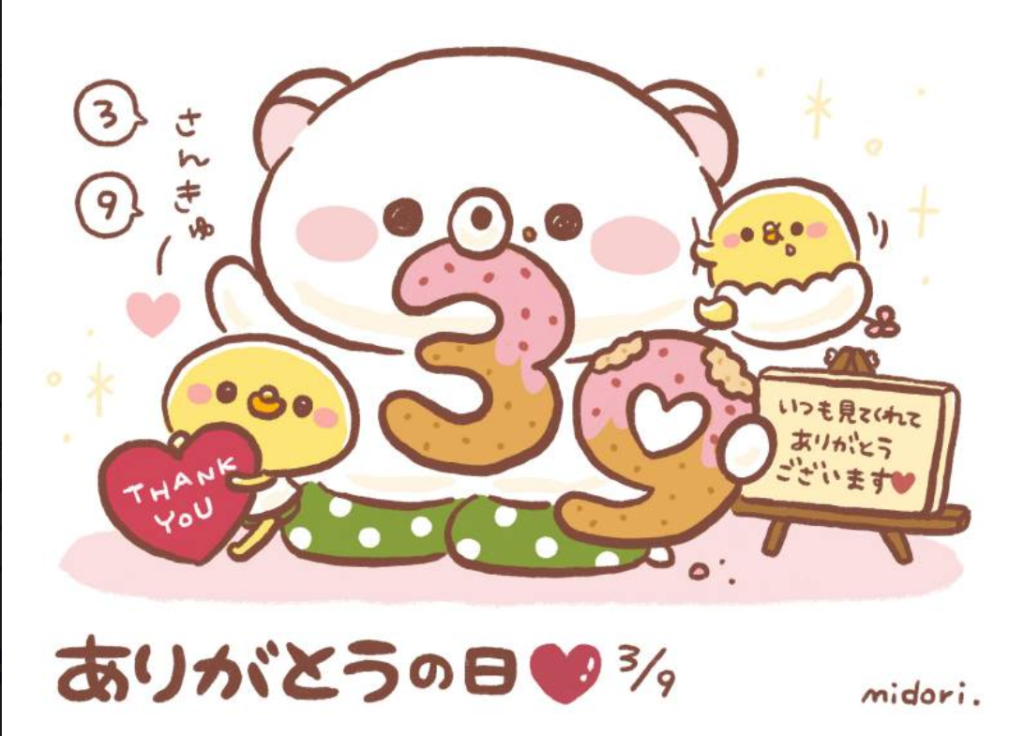In Japan, today is “Thank You Day.” Today is 3/9 — well, it still is here in California, anyway.
Numbers in Japanese have several possible pronunciations, so there’s a lot of wordplay based on that. Business phone numbers will often reflect the business’ service in some way by combining the pronunciations of the numbers in a way that makes a phrase relating to the business. This page has a lot of examples.

Today is “Thank You Day” in Japan because one way to pronounce the numbers 3 and 9 is “san kyu,” or “thank you.” Isn’t that cute? The above picture explains it. It’s from the Facebook page 今日は何の日, which means “What Day Is Today.” The little sign says, “いつも見てくれてありがとうございます,” which means “Thank you for always looking (at this page/site).”
I saw a listing for a freelance job editing mystery shopper narratives and decided to apply. The application requires a short writing sample about a good or bad customer service experience, so I’m going to include it right here and let my writing do double duty! I don’t know if the job will be right for my circumstances, but it won’t hurt to write a short entry, as follows:
One of the outstanding aspects of living in Japan was the overall superior level of customer service. Universally, Japanese workers greet all customers with a hearty “Irasshaimase!” (“Welcome!”) and a bow. Customer-facing workers follow numerous rules in order to appear alert and helpful without overwhelming or annoying the clientele.
An example of excellent service occurred when a friend, Robert, visited me on a trip to Kyoto. We perused many stores that sold traditional Japanese crafts as souvenirs. A shop peddling handmade Japanese paper caught his attention and we soundlessly entered the museum-like shop, empty other than one middle-aged female worker. After greeting us, she stepped back into a corner to organize some products while observing us from the corner of her eye.
We admired all the lovely merchandise until we stopped at a display of stationery. Robert couldn’t decide which set to buy, so the worker quietly approached us to explain the features of each type of paper and the significance of the designs — one type of flower for each of the four seasons. Her service was just right; she was there when we needed help but not a moment before.
What do you think? The writing sample had to be under 200 words so I had to prune a lot out of it. I’ll continue with a complaint I’ve heard about Japanese customer service, which is that workers can be inflexible if you have special requests. For example, I’ve heard that if you ask for mustard on your burger rather than the ketchup it normally comes with, a worker might deny your request or simply not know how to process it without a lot of commotion.
This is probably most true if you ask for an extra side of something because Japanese meals tend to be set up a certain way and not designed to be added to. If there are a hundred burgers to sell with a hundred packets of sauce, they don’t want to have a discrepancy that will mess up the inventory numbers, or so I’ve heard.
I haven’t had this problem personally because I tend to not be a fussy, demanding customer. I look at what’s available and pick the product that most lines up with what I want. I don’t tend to try to customize things because I don’t want to be annoying. I’m not saying that nobody should make a special request, but rather that I’m not the type to do so unless it’s absolutely necessary.
This is one of the aspects of Japanese culture that is both easy and hard. In a given situation, there are many “set phrases” of what to say to someone, whether customer, boss, or coworker. Any business Japanese class will have pages of phrases of exactly how to express particular requests, explanations or complaints. It’s a lot to memorize! There’s not a ton of flexibility there, and after working in Japan for a short time you’ll have heard the same phrases hundreds of times.
On the other hand, once you have the phrases memorized, it’s easy to know how to respond to a given situation. Sometimes it can take a lot out of me mentally to think of the precise words to, for example, express my appreciation to a coworker or friend. But in Japanese it’s easy: いつもお世話になっております。That’s pronounced itsumo osewa ni natte orimasu and means “I’m always in your debt.” It’s such a convenient way to express appreciation and isn’t taken as trite just because it’s a set phrase that everyone uses.
Another example is the ubiquitously used よろしくお願いいたします。That’s pronounced yoroshiku onegai itashimasu and means “I humbly ask you to be kind to me.” It’s used in tons of situations, from meeting someone for the first time to asking a favor of someone.
Japanese has a steep learning curve in some ways, but once you’ve learned some basic phrases, those phrases will take you a long way.